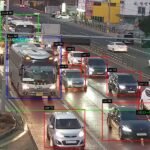In the United States, the search for parking spaces has become a formidable challenge with over 256 million vehicles vying for nearly two billion parking spots. However, the advent of artificial intelligence is ushering in a new epoch in the field of smart parking systems, offering potential solutions to these urgent problems.
It is estimated that Americans spend an average of 17 hours each year searching for parking, resulting in an astonishing $345 in wasted time and fuel costs. This issue significantly contributes to traffic congestion, as drivers circling for parking exacerbate traffic jams. Moreover, the frequency of improperly parked vehicles increases the risk of incidents in parking lots.
Across a variety of sectors, cities, and parking lot managers are utilizing technology to tackle parking difficulties. Cutting-edge innovations in AI and machine learning (ML) are now equipping drivers with real-time information about available parking spaces, marking a paradigm shift in how we address parking challenges.
Amid the turmoil of parking shortages and inefficiencies, AI-driven solutions shine a beacon of hope. These technologies employ advanced algorithms and data analytics to refine parking experiences, bringing about a revolution in our daily routines.
AI-based smart parking is revolutionizing the way parking spaces are managed. It leverages data from a variety of sensors and cameras to establish an intelligent parking system that is powered by artificial intelligence. These sensors are either embedded within the parking lot or strategically placed in the vicinity to detect open parking spaces.
The system is connected to a multitude of Internet of Things (IoT) devices. The software associated with these devices interprets the data collected by the sensors. This interpretation process enables the software to provide users with real-time information about available parking spots. In addition to the availability of spots, the software also provides details such as parking rates.
Some advanced platforms take this a step further by offering additional features like reservations and electronic payments. These features significantly simplify the parking process, making it more user-friendly. By automating various aspects of parking, AI-based smart parking systems not only enhance the efficiency of parking management but also improve the overall parking experience for drivers.
Innovative Technologies Empowering Smart Parking
Deep Learning: Deep learning, a subfield of machine learning, is heavily reliant on the extensive collection of parking data by artificial intelligence neural networks. These networks, which function similarly to human learning processes, improve their precision as they process and learn from more data. Over time, they develop a more nuanced understanding of the data, enabling them to make more accurate predictions and decisions.
Computer Vision: Computer vision technology enhances the efficiency of parking management by utilizing data from parking lot cameras. It identifies vacant parking spots by recognizing specific markings and verifying their presence using geometric data. This process significantly improves the accuracy of spot detection and allocation.
Ground Sensors: Ground sensors, particularly those based on radar technology, play a crucial role in assessing the availability of parking spaces. They detect occupied areas as vehicles pass over them, providing real-time data that aids in efficient parking lot management.
Parking Ticket Machines: Parking ticket machines are commonly used in structured parking setups. They keep track of vehicles entering or exiting a parking lot, providing valuable data for parking management. However, their effectiveness can be limited in large, sprawling parking lots due to constraints in their field of vision.
Advantages of AI-Based Smart Parking for Drivers
Reduced Search Activity: One of the significant advantages of smart parking is the reduction in search activity. By efficiently allocating parking spots, smart parking minimizes the traffic caused by drivers searching for parking spots. This streamlining of traffic flow significantly reduces the time drivers spend looking for parking.
Fuel Savings: Smart parking also contributes to fuel savings. By enabling drivers to find parking spots effortlessly, it conserves valuable resources like time and fuel. This efficiency not only contributes to overall cost savings for drivers but also has a positive impact on the environment by reducing carbon emissions.
Alleviated Parking Stress: Through the integration of Internet of Things (IoT) technology, smart parking alleviates the stress associated with parking. Drivers can anticipate parking availability beforehand and reserve spots, eliminating the hassle and stress of hunting for parking. This convenience significantly improves the overall parking experience for drivers.
Benefits for Businesses
Improved Parking Performance: Smart parking systems offer a range of personalized services that significantly enhance the overall parking experience. By providing real-time information about available parking spots, these systems reduce the time and effort drivers spend searching for a spot, thereby minimizing driver frustration. Additionally, by reducing the need for vehicles to circle in search of parking, smart parking systems cut down on vehicle emissions. This not only contributes to a cleaner environment but also improves indoor air quality in parking garages, creating a healthier environment for users.
Optimal Facility Use: Smart parking systems are equipped with advanced tracking capabilities that monitor parking traffic patterns. This data provides valuable insights into the usage of parking facilities, including peak usage times, most frequently used spots, and duration of parking. Businesses can leverage this data to make informed decisions about facility expansions or reductions. For instance, if the data shows that a parking facility is consistently underutilized, the business might decide to reduce the size of the facility or repurpose some of the space. Conversely, if a facility is frequently over capacity, the business might choose to expand it. In this way, smart parking systems enable businesses to optimize space utilization, ensuring that parking facilities are used efficiently.
Effective Management Practices: The real-time data provided by smart parking systems is a powerful tool for parking management. Managers can monitor how long vehicles are parked in a spot and identify any irregularities, such as vehicles that are parked for an unusually long time. This can help in identifying unauthorized usage of parking spots. Furthermore, the data can be used to enforce parking rules and regulations, ensuring that all users comply with the stipulated guidelines. By facilitating effective monitoring and management practices, smart parking systems contribute to a more organized and efficient parking environment.
Mobile Apps in AI-Based Parking Systems
Mobile applications have emerged as a crucial component in the realm of smart parking, serving as the primary interface between users and the advanced technology that powers these systems. These apps provide a convenient and user-friendly platform for accessing a wide range of smart parking services.
One of the key services offered by these apps is the ability to reserve parking spaces. Users can view the availability of parking spots in real-time and reserve a spot that suits their needs. This eliminates the need for drivers to physically search for available spaces, saving time and reducing stress.
Another significant feature of these mobile apps is the provision for automated payments. Users can pay for their parking directly through the app, using various digital payment methods. This eliminates the need for physical cash or cards, making the payment process quicker and more convenient. Furthermore, it also allows for the implementation of dynamic pricing models, where parking rates can vary based on factors like time of day, location, and demand.
In addition to reservation and payment services, these apps also offer directional assistance. This feature guides users to their reserved parking spot, further simplifying the parking process. It can also direct users back to their parked vehicle, a useful feature in large parking lots where it can be easy to forget the exact location of one’s vehicle.
Mobile apps are amplifying the efficiency of smart parking innovations by making them more accessible and user-friendly. They are streamlining the parking process, making it quicker, easier, and more convenient for users. As smart parking technology continues to evolve, these apps are likely to offer even more advanced features, further enhancing the parking experience.
Future Trends in Smart Parking
Automated Parking Garages: Automated parking garages, particularly those of the vertical variety, are becoming increasingly popular. These innovative structures utilize advanced technology to streamline the parking process. The primary advantage of these systems is their ability to save space, a critical factor in densely populated urban areas where parking is often scarce. By stacking cars vertically, these automated garages can accommodate a large number of vehicles within a relatively small footprint. Furthermore, the automation of parking procedures enhances efficiency by reducing the time taken to park and retrieve vehicles.
Self-Driving Vehicles: The advent of self-driving vehicles is set to revolutionize the parking industry. These vehicles come equipped with self-parking features that enable them to execute parking maneuvers with a high degree of precision. This capability not only simplifies the parking process for drivers but also optimizes space utilization within parking lots. By parking more accurately and consistently than human drivers, self-driving cars can fit into smaller spaces and reduce the amount of wasted space in parking lots.
Internet of Things (IoT): The Internet of Things (IoT) is playing a pivotal role in the evolution of smart parking. IoT devices, such as sensors and cameras, are being used to monitor parking lots in real-time. These devices can detect the presence or absence of vehicles in parking spots and relay this information to drivers via smartphone apps or other interfaces. This real-time visibility into parking spot availability significantly reduces the time drivers spend searching for a spot, thereby reducing traffic congestion and carbon emissions. Moreover, the data collected by these IoT devices can be analyzed to gain insights into parking patterns and behaviors, which can be used to further optimize parking management.
As urban areas continue to grow and the number of vehicles increases, the demand for efficient parking solutions has become more pressing. Thankfully, the convergence of technological progress and artificial intelligence (AI) has given rise to a new generation of innovative smart parking systems. These systems, which harness AI algorithms and data analytics, offer a multitude of benefits, including the potential to reduce traffic congestion and maximize the use of parking spaces.
The ongoing advancements in AI hold the promise of even more refined solutions that can transform resource allocation, mitigate traffic congestion, and enhance the overall parking experience for drivers and city residents. AI has had a significant influence on smart parking solutions, transforming traditional approaches into efficient, data-driven systems. With future developments on the horizon, we can expect further revolutionary changes in the landscape of parking solutions.
Naorem Mohen is the Editor of Signpost News. Explore his views and opinion on X: @laimacha.

